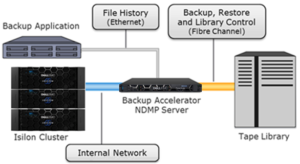In addition to a variety of software features, OneFS 9.3 also introduces support for two new PowerScale accelerator nodes. Based on the 1RU Dell PE R640 platform, these include the:
- PowerScale P100 performance accelerator
- PowerScale B100 backup accelerator.
Other than a pair of low capacity SSD boot drives, neither the B100 or P100 nodes contain any local storage or journal. Both accelerators are fully compatible with clusters containing the current PowerScale and Gen6+ nodes, plus the previous generation of Isilon Gen5 platforms. Also, unlike storage nodes which require the addition of a 3 or 4 node pool of similar nodes, a single P100 or B100 can be added to a cluster.
The P100 accelerator nodes can simply, and cost effectively, augment the CPU, RAM, and bandwidth of a network or compute-bound cluster without significantly increasing its capacity or footprint.

Since the accelerator nodes contain no storage and a sizable RAM footprint, they have a substantial L1 cache, since all the data is fetched from other storage nodes. Cache aging is based on a least recently used (LRU) eviction policy and the P100 is available in two memory configurations, with either 384GB or 768GB of DRAM per node. The P100 also supports both inline compression and deduplication.
In particular, the P100 accelerator can provide significant benefit to serialized, read-heavy, streaming workloads by virtue of its substantial, low-churn L1 cache, helping to increase throughput and reduce latency. For example, a typical scenario for P100 addition could be a small all-flash cluster supporting a video editing workflow that is looking for a performance and/or front-end connectivity enhancement, but no additional capacity.
On the backup side, the PowerScale B100 contains a pair of 16Gb fibre channel ports, enabling direct or two-way NDMP backup from a cluster directly to tape or VTL, or across an FC fabric.

The B100 backup accelerator integrates seamlessly with current DR infrastructure, as well as with leading data backup and recovery software technologies to satisfy the availability and recovery SLA requirements of a wide variety of workloads. The B100 can be added to a cluster containing current and prior generation all-flash, hybrid, and archive nodes.

The B100 aids overall cluster performance by offloading NDMP backup traffic directly to the FC ports and reducing CPU and memory consumption on storage nodes, thereby minimizing impact on front end workloads. This can be of particular benefit to clusters that have been using gen-6 nodes populated with FC cards. In these cases, a simple, non-disruptive addition of B100 node(s) will free up compute resources on the storage nodes, both improving client workload performance and shrinking NDMP backup windows.
Finally, the hardware specs for the new PowerScale P100 and B100 accelerator platforms are as follows:
| Component (per node) | P100 | B100 |
| OneFS release | 9.3 or later | 9.3 or later |
| Chassis | PowerEdge R640 | PowerEdge R640 |
| CPU | 20 cores (dual socket @ 2.4Ghz) | 20 (dual socket @ 2.4Ghz) |
| Memory | 384GB or 768GB | 384GB |
| Front-end I/O | Dual port 10/25 Gb Ethernet
Or Dual port 40/100Gb Ethernet |
Dual port 10/25 Gb Ethernet
Or Dual port 40/100Gb Ethernet |
| Back-end I/O | Dual port 10/25 Gb Ethernet
Or Dual port 40/100Gb Ethernet Or Dual port QDR Infiniband |
Dual port 10/25 Gb Ethernet
Or Dual port 40/100Gb Ethernet Or Dual port QDR Infiniband |
| Journal | N/A | N/A |
| Data Reduction Support | Inline compression and dedupe | Inline compression and dedupe |
| Power Supply | Dual redundant 750W 100-240V, 50/60Hz | Dual redundant 750W 100-240V, 50/60Hz |
| Rack footprint | 1RU | 1RU |
| Cluster addition | Minimum one node, and single node increments | Minimum one node, and single node increments |
Note: Unlike PowerScale storage nodes, since these accelerators do not provide any storage capacity, the PowerScale P100 and B100 nodes do not require OneFS feature licenses for any of the various data services running in a cluster.